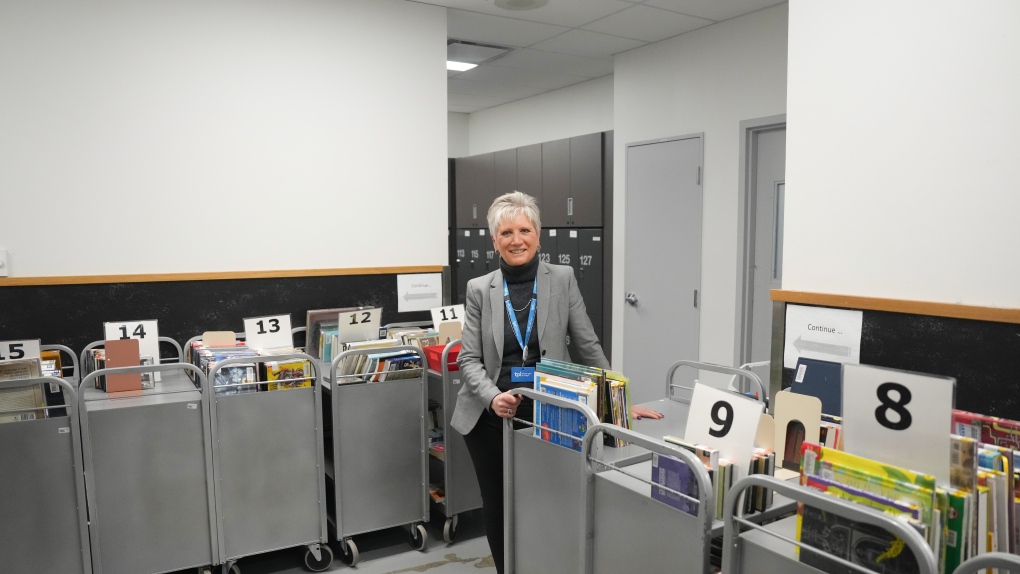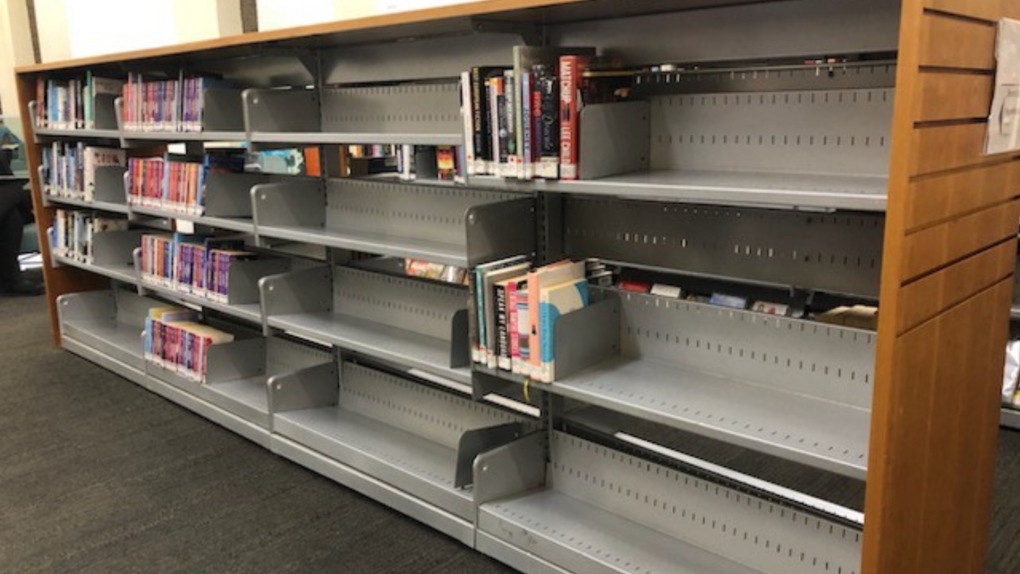How the Toronto library is recovering from a cyberattack, one book at a time
 Kim Huntley Area Manager for North York Central Library, is photographed amongst books readied to be returned to the Library's shelves, in Toronto, on Friday February 23, 2024. THE CANADIAN PRESS/Chris Young
Kim Huntley Area Manager for North York Central Library, is photographed amongst books readied to be returned to the Library's shelves, in Toronto, on Friday February 23, 2024. THE CANADIAN PRESS/Chris Young
Hundreds of thousands of books have been freed from a months-long purgatory as scores of staffers race to get them out of storage and back on shelves following a cyberattack that felled the Toronto Public Library's computer systems in October.
Workers at a Scarborough distribution hub have cleared more than 10 tractor-trailers full of boxes stacked five high, while staff who remained at the branches made their way through their own stockpiles.
"We're working through the backlog, but yet at the same time we have new things coming in because there's all the new material that has not been processed in three months' time," said Kennis Deng, operations supervisor at the North York Central Library.
"It's just lots and lots of things. Lots of puzzles that we try to put together and work through with staff while we change workflows."
- Download our app to get local alerts on your device
- Get the latest local updates right to your inbox
It's the culmination of months of planning that began on Oct. 28, when library staff learned hackers had broken into the network of Canada's largest public library system.
Staff immediately shut down the library's "technical environment" — including its database of books, its public computers and some of its digital materials — in an effort to contain the data breach while they secured their systems.
The library is slowly returning online. Some of the website went back up in January, and public computing resumed on Feb. 5.
Police are investigating, as are third-party experts. So far, they've found that while the server storing the bulk of customer information wasn't breached, it's possible that some pieces of that information were stored on the server that was compromised.
Forensic investigators also found that the hackers had stolen the personal information of current and former staff members, dating back to 1998: their names, social insurance numbers, dates of birth, home addresses, and copies of government-issued ID they gave to the library.
That fact is always in the back of Deng's mind.
"I'm not going to sugar coat it. It's very stressful because on the one hand, we know for a fact that as staff, our personal information got stolen," she said. "On the other hand, I try to stay strong because of my position as a supervisor. I need to remain calm."
 Barren bookshelves at a Toronto Public Library branch. (Hannah Alberga/CTV News Toronto)
Barren bookshelves at a Toronto Public Library branch. (Hannah Alberga/CTV News Toronto)
Deng, like her colleagues, is working on overdrive. She's supervising, yes, but she's also pitching in with the backlog.
While the library allowed customers to return books while its systems were down, staff were not able to check those books in since the catalogue was off-line. Instead, bar codes were written down by hand and freshly returned books went into cardboard boxes.
When check-ins resumed on Feb. 12, there were 2,000 of those boxes in a storage room on the sixth floor of the North York branch.
Because North York Central is one of the largest branches in the city, spanning six floors, it has some electronic aid: a large sorting machine that scans RFID tags hidden in each book to determine where it belongs. The sorter then moves it along a conveyor belt and drops it into a bin that corresponds with the section of the library it belongs in.
Then, a staff member puts the contents of the bin onto a cart. The cart is taken to its proper shelf, where the books are put away.
Kim Huntley, area manager for the branch, said staff are checking in five times the normal volume of materials.
Two weeks in, with so many books checked in at once, the shelves are starting to get crowded. Staff have to shift some of the books, and in some cases take the less popular items off the shelves until borrowing picks up.
All the while, patrons are still coming into the library. At North York Central, 5,000 to 6,000 people come through each day, Huntley said.
"We haven't seen a drop in our customer visits," she said. "There's a huge thirst for space in Toronto. People come here to use our spaces for study, for enjoyment, for relaxation, to connect with other people."
But that's meant that staff are divided between an increased workload behind the scenes, and a regular public-facing workload.
That's made manifest in the sorting room, where newly returned books — pushed through a slot at the library entrance — get inserted into the left side of the sorter, and staff work through the stockpile on the right side.
The left is a trickle; the right is a steady stream.
While North York Central was able to store some of the returned books in the building, those that belong to the branch but were returned to other locations were sent to the Scarborough distribution hub, where they joined 15 truckloads of their kin. Each trailer contained 800 boxes, with 30 items per box.
As soon as the books arrived in Scarborough, staff started boxing them up and putting them in the trucks, said Roman Svab, manager of distribution services.
At first they put them in the grey plastic boxes they typically use, but that didn't last long.
"We ran out of grey boxes after two trailers," Svab said.
They switched to cardboard for the remaining 13, adding another step to the process once check-ins resumed.
It goes like this: a worker unloads a palette of boxes from one of the trucks using a forklift. The cardboard boxes are taken to the check-in area, where a staff member scans each book and places it in a grey box, separating books on hold from books being returned. Then the boxes make their way to the sorter -- a much larger version of the machine at North York Central, which can process up to 60,000 books per day.
Newly acquired books also lived at the Scarborough site for a few months, before they could be added to the library system. Now, carts of them fill the office space, waiting to be processed.
Once the books are sorted into boxes, they're loaded back onto trucks and delivered to their branch.
Since check-ins started up again, the facility has been operating from 9 a.m. to 8:30 p.m. daily.
It's fast work, physical work, but smooth and well-organized, Svab said.
"We're tired," he said, "but not stressed."
This report by The Canadian Press was first published Feb. 29, 2024.
CTVNews.ca Top Stories

Biden gives life in prison to 37 of 40 federal death row inmates so Trump can't have them executed
U.S. President Joe Biden announced on Monday that he is commuting the sentences of 37 of the 40 people on federal death row, converting their punishments to life imprisonment just weeks before president-elect Donald Trump, an outspoken proponent of expanding capital punishment, takes office.
Weather advisories issued for GTA, areas north of Toronto ahead of 'significant' snowfall
Holiday travellers and commuters could be in for a messy drive on Monday morning as a significant round of snowfall moves into the region.
Nissan, Honda announce plans to merge, creating world's No. 3 automaker
Japanese automakers Honda and Nissan have announced plans to work toward a merger, forming the world's third-largest automaker by sales as the industry undergoes dramatic changes in its transition away from fossil fuels.
Trump suggests the U.S. should take back the Panama Canal. Could they do that?
Donald Trump suggested Sunday that his new administration could try to regain control of the Panama Canal that the United States 'foolishly' ceded to its Central American ally, contending that shippers are charged 'ridiculous' fees to pass through the vital transportation channel linking the Atlantic and Pacific Oceans.
Man handed 5th distracted driving charge for using cellphone on Hwy. 417 in Ottawa
An Ottawa driver was charged for using a cellphone behind the wheel on Sunday, the fifth time he has faced distracted driving charges.
Wrongfully convicted N.B. man has mixed feelings since exoneration
Robert Mailman, 76, was exonerated on Jan. 4 of a 1983 murder for which he and his friend Walter Gillespie served lengthy prison terms.
opinion Christmas movies for people who don't like Christmas movies
The holidays can bring up a whole gamut of emotions, not just love and goodwill. So CTV film critic Richard Crouse offers up a list of Christmas movies for people who might not enjoy traditional Christmas movies.
What's open and closed over the holidays in Canada
As Canadians take time off to celebrate the holidays, many federal offices, stores and businesses will be closed across the country on Christmas Day and New Year's Day.
The rent-a-friend industry is booming among Canada's Chinese diaspora
Dozens of people are offering rent-a-friend services on Xiaohongshu, a social media platform also known as Little Red Book or China's Instagram, in cities including Vancouver, Calgary and Toronto.

































